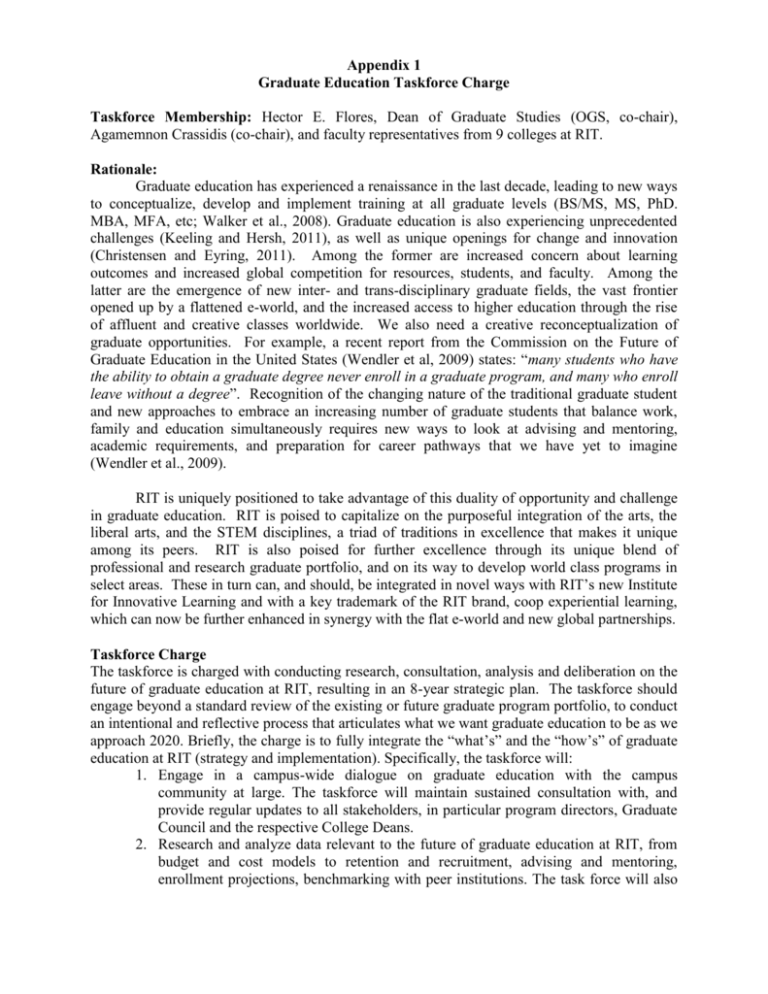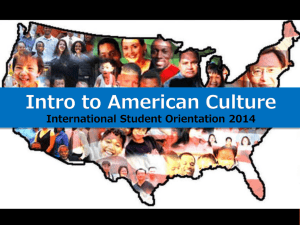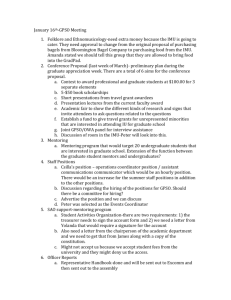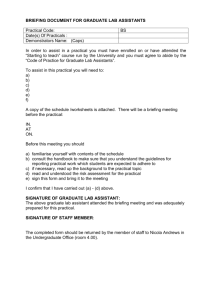Appendix 1. Graduate Taskforce Charge
advertisement

Appendix 1 Graduate Education Taskforce Charge Taskforce Membership: Hector E. Flores, Dean of Graduate Studies (OGS, co-chair), Agamemnon Crassidis (co-chair), and faculty representatives from 9 colleges at RIT. Rationale: Graduate education has experienced a renaissance in the last decade, leading to new ways to conceptualize, develop and implement training at all graduate levels (BS/MS, MS, PhD. MBA, MFA, etc; Walker et al., 2008). Graduate education is also experiencing unprecedented challenges (Keeling and Hersh, 2011), as well as unique openings for change and innovation (Christensen and Eyring, 2011). Among the former are increased concern about learning outcomes and increased global competition for resources, students, and faculty. Among the latter are the emergence of new inter- and trans-disciplinary graduate fields, the vast frontier opened up by a flattened e-world, and the increased access to higher education through the rise of affluent and creative classes worldwide. We also need a creative reconceptualization of graduate opportunities. For example, a recent report from the Commission on the Future of Graduate Education in the United States (Wendler et al, 2009) states: “many students who have the ability to obtain a graduate degree never enroll in a graduate program, and many who enroll leave without a degree”. Recognition of the changing nature of the traditional graduate student and new approaches to embrace an increasing number of graduate students that balance work, family and education simultaneously requires new ways to look at advising and mentoring, academic requirements, and preparation for career pathways that we have yet to imagine (Wendler et al., 2009). RIT is uniquely positioned to take advantage of this duality of opportunity and challenge in graduate education. RIT is poised to capitalize on the purposeful integration of the arts, the liberal arts, and the STEM disciplines, a triad of traditions in excellence that makes it unique among its peers. RIT is also poised for further excellence through its unique blend of professional and research graduate portfolio, and on its way to develop world class programs in select areas. These in turn can, and should, be integrated in novel ways with RIT’s new Institute for Innovative Learning and with a key trademark of the RIT brand, coop experiential learning, which can now be further enhanced in synergy with the flat e-world and new global partnerships. Taskforce Charge The taskforce is charged with conducting research, consultation, analysis and deliberation on the future of graduate education at RIT, resulting in an 8-year strategic plan. The taskforce should engage beyond a standard review of the existing or future graduate program portfolio, to conduct an intentional and reflective process that articulates what we want graduate education to be as we approach 2020. Briefly, the charge is to fully integrate the “what’s” and the “how’s” of graduate education at RIT (strategy and implementation). Specifically, the taskforce will: 1. Engage in a campus-wide dialogue on graduate education with the campus community at large. The taskforce will maintain sustained consultation with, and provide regular updates to all stakeholders, in particular program directors, Graduate Council and the respective College Deans. 2. Research and analyze data relevant to the future of graduate education at RIT, from budget and cost models to retention and recruitment, advising and mentoring, enrollment projections, benchmarking with peer institutions. The task force will also study current trends in graduate education worldwide, with the goal of defining the graduate program traits that will help RIT be a unique, world class institution for graduate education and research by 2020. The OGS will secure and share the data on the above topics and, as appropriate, other information deemed of relevance by the taskforce membership and the stakeholders. 3. Using the guiding principles and guiding questions described below, develop a vision and implementation plan for graduate education in 2020 that achieves the appropriate balance between imagination, risk-taking, innovation, and the prudent use of human and financial resources. The strategic and implementation plan will be bold, visionary and concise, true to the RIT brand. It will include, but will not limited to, the following elements: a. A plan to further advance graduate education excellence at RIT, building on the Academic Blueprint recommendations and in synergy with the Innovative Learning Institute and other initiatives impacting graduate education. b. A plan to ensure that select world-class graduate programs remain and/or become leaders in their respective disciplines/interdisciplines within existing and projected academic and fiscal challenges. c. A plan to identify and access significant new resources to support the graduate education enterprise at large. d. A plan to improve processes for graduate program review, continuation, reinvention, or phase-out. e. A plan to improve on the balance and synergy of professional degrees, MFAs, liberal arts, and research-based MS and PhD degrees. f. A plan for an operational and financial cost model that achieves a selfsustaining steady state. g. A plan for building a strong culture of graduate education at RIT. Guiding Principles for a Graduate Education Strategic Plan: In consultation with the Provost, the OVPR, and the Research and Graduate Education subcommittee of the Board of Trustees, the Dean of Graduate Studies has developed the following guiding principles for a graduate education strategic plan: 1. Undergraduate and graduate education at RIT will be complementary, synergistic, and collaborative, enhancing the excellence, innovation, and global relevance of an RIT degree. 2. Graduate education at RIT will aim at a purposeful multi-disciplinary integration of STEM, humanities, social sciences and the arts to prepare students to lead innovation and change. 3. Graduate education at RIT will enhance basic and applied research, scholarship, and creative endeavors, in the RIT tradition of experiential learning and innovation. Graduate programs will provide new opportunities for non-traditional students. 4. Graduate education at RIT is a strategic priority and will be specifically included in the institute-wide KRAs. 5. Graduate education at RIT will be driven by continuous assessment, using quality metrics and indicators of program success to drive continuous improvement to sustain and enhance the program’s performance. 6. Graduate education at RIT will leverage select degree programs with the goal of developing select world-class professional and research degree programs. 7. All graduate programs will interface with key external stakeholders to ensure that the career orientation of RIT is reflected in our graduate education portfolio. In addition, select graduate degree programs will interface with industrial and government stakeholders to undergird RIT’s goals for sponsored graduate and undergraduate research and scholarship. 8. Graduate programs will support the recruitment and retention of a truly world-class faculty through enhanced excellence in research opportunities and enhanced quality of incoming students. 9. Graduate programs will operate under a sustainable budgetary model without undue burden on undergraduate operations, and be competitively positioned for maximum selectivity in student acceptances. 10. Graduate education at RIT will provide an environment that encourages graduate student inclusion into, and enrichment of, the unique culture of RIT. The graduate programs will leverage the experiential nature of the education to provide opportunities for flexibility in career paths. Three Pillars for the Future of Graduate Education at RIT: Guiding Questions Consistent with the KRAs in the current RIT strategic plan and with RIT’s unique strengths and traditions, a graduate education strategic plan can be conceptualized in terms of three pillars: Excellence, Innovation, and Global Relevance. The taskforce’s deliberations will be informed, but not limited to, by the following guiding questions: Excellence How do we attract the best possible graduate students to RIT in an environment that is increasingly competitive for external funding and other sources of support? How should we approach the strategic recruitment of top students? What should be the elements of such a strategy? What should be the main long-term, strategic quality indicators for graduate programs at RIT? Which quality indicators/metrics for graduate education can be applied across the board, and which indicators/metrics that should apply specifically to each College? What should be the role of graduate students in providing feedback regarding the quality of graduate programs at RIT? What should be the role and responsibilities (i.e. mentoring, advising, professional development of students) of faculty involved in graduate programs that would lead to sustained and increased quality? What is the role of periodic review of graduate program performance and what would be the major metrics to gather? What kinds of quantitative and qualitative outcomes should inform graduate program reviews? Innovation How can we integrate innovation, a core element of RIT's brand, into graduate education? What criteria can be used to define and encourage innovation and continuous quality change in graduate programs? What kind of incentives to faculty and graduate students would be necessary to foster innovation among graduate programs? What is the appropriate balance of disciplinary and interdisciplinary innovation suitable to RIT? Which kinds of professional development opportunities for our graduate students would enable an appropriate balance of innovation and solid disciplinary competency appropriate? Which professional development opportunities should be fully interdisciplinary? What combination of innovative curriculum, professional and enriching activities would best serve graduate students for career path flexibility? Global Relevance How can we remain ahead of a world that continues to change at an ever accelerated pace? What should be the role of graduate education in a complex, dynamic and ever-changing world? What kinds of globally relevant skills should be available to our graduate students? What kinds of international experiences should be made available to RIT graduate students? What kind and level of foreign language competencies will be necessary for our graduate students in 2020? What kinds of leadership, communication and critical thinking skills will be needed by our graduate students to be competitive in 2020 and how would be enable them? What level of flexibility, nimbleness, and adaptability should be incorporated into graduate curricula in a world in constant flux? Timeline: the work of the task force will result in a 5-8 year strategic plan. An advanced draft will be shared and discussed with the Graduate and Research subcommittee of the Board of Trustees in April 2013, and the final document will be submitted to the Provost by May 1, 2013. Cited References Christensen, C. M., and H. J. Eyring. 2011. The Innovative University: Changing the DNA of Higher Education from the Inside Out. Jossey-Bass, San Francisco, CA, 475 p. Keeling, R.P., and R.H. Hersh. 2011. We Are Losing Our Minds. Rethinking American Higher Education. Palgrave Macmillan, New York, 205 p. Walker, G.E., C.M. Golde, L Jones, A. Conklin Bueschel, and P. Hutchings. 2008. The Formation of Scholars: Rethinking Doctoral Education for the Twenty-First Century. JosseyBass, San Francisco, CA, 232 p. Wendler, C., B. Bridgeman, F. Cline, J. Rock, N. Benn, and P. McAllister. 2010. The Path Forward: The Future of Graduate Education in the United States. Educational testing Service, Princeton, NJ, 64 p. Revised – 9/9/13 Graduate Education Task Force Membership Callie Babbitt (cwbgis@rit.edu) Gerald Bateman (gcbnmp@rit.edu) Assistant Professor, Golisano Institute for Sustainability Professor/Director, MS in Secondary Education Program, National Technical Institute for the Deaf (NTID). (Marianne Gustafson – alternate) NTID David Bond (david.bond@rit.edu) Director, Sponsored Program Services, Office of the Vice President for Research Robin Cass (robin.cass@rit.edu) Professor, School for American Crafts Ag Crassidis (co-chair) (alceme@rit.edu) Associate Professor of Mechanical Engineering, Kate Gleason College of Engineering and Chair, Graduate Council Diane Ellison (dmeges@rit.edu) EMCS representative, Assistant VP, Graduate & Part-Time Enrollment Services Hector Flores (co-chair) (hefgrad@rit.edu) Dean of Graduate Studies Jennifer Lukomski (jalgsp@rit.edu) Associate Professor, Department of School Psychology (Esa Rantanen – alternate) Psychology Sam McQuade (scmcms@rit.edu) Graduate Program Director, Center for Multidisciplinary Studies, Academic Affairs Erika Mesh (erika.s.mesh@gmail.com) PhD Computer and Information Science Student, GSDC Daniel Ornt (dboihst@rit.edu) Vice President and Dean of the Institute of Health Sciences and Technology James Perkins (japfaa@rit.edu) Professor, Medical Illustration program, Institute of Health Science and Technology Manian Ramkumar (smrmet@rit.edu) Director, Center for Electronics Manufacturing & Assembly, College of Applied Science and Technology Andrew Robinson (axrsps@rit.edu) Director, PhD & MS Program in Astrophysical Sciences and Technology, College of Science Eli Saber (esseee@rit.edu) Professor of Electric & Microelectronic Engineering Pengcheng Shi (pencheng.shi@rit.edu) Ph.D. Program Director, Golisano College of Computing & Info. Sciences . (Yin Pan - alternate) Marla Schweppe (mkspph@rit.edu) School of Informatics, GCCIS Professor of Computer Graphics Design, College of Imaging Arts & Sciences Don Wilson (dwilson@saunders.rit.edu) (Peggy Tirrell – alternate) Director of EMBA Program – Saunders College of Business




